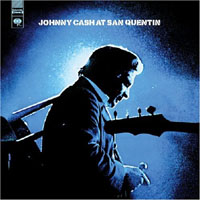Susan and I watched Walk The Line last night. We both enjoyed it — especially the performances of Joaquin Phoenix and Reese Witherspoon — but with this movie coming out a year after the similarly plot-pointed biopic on Ray Charles in 2004, we both couldn’t help but wonder what legendary musician’s film will be rolled out for 2006, replete with horribly traumatic sibling loss and long-term drug addiction.
 Afterwards I dug out my mom’s tired old copy of his LP Johnny Cash At San Quentin, the very same disc I first heard when it came out in 1969 when I was five years old.
Afterwards I dug out my mom’s tired old copy of his LP Johnny Cash At San Quentin, the very same disc I first heard when it came out in 1969 when I was five years old.
Coincidentally, Ray Charles was another of my first musical influences. If my childhood musical tastes could be reduced to a “Top Three” it would be Cash’s A Boy Named Sue, Hit The Road Jack by Ray Charles, and Baby Elephant Walk by Henry Mancini from the soundtrack of film Hatari. Just to represent some semblance of culture, I must also make mention that Rossini’s William Tell Overture was right up there (even if it was because it was used as the theme to the TV series featuring my first hero The Lone Ranger).
I played those over and over and over and over and over. And over. When whatever song would threaten to end I would race back to the old Admiral Hi-Fi with its Murphy bed-style drop-down turntable and ever so carefully pick up the needle and replace it at the beginning of the track. It’s a quirk I still do to this day (albeit without the need to deal with needles and turntables). If there’s a song I enjoy I will listen to it so repetitively as to be considered perhaps a sign of autism or other mental illness.
That’s just how I am.
Certainly I listened to the entire respective albums that contained those faves, but it was those specific songs that sang to me the strongest.
Listening to the second side of Cash’s album this morning — easily for the first time in 20-plus years (maybe even since I was that 5 year old), I was first surprised at what good condition it was in. I expected it to have scratches and hisses and pops and warps and such, but it was remarkably well maintained.
The second thing that caught me off guard was how much Johnny taught me with his songs. While clearly drawn to A Boy Named Sue because as a fatherless boy I so identified with the anger and betrayal and need for revenge articulated by Cash through the young man in the song whose father had deserted him and gave him that awful name, what I never acknowledged is that Johnny taught me to forgive my dad as well. Sure, he sings about Sue finding the sumbitch and brawling violently with him, but in the end:
I got all choked up and I threw down my gun
And I called him my pa, and he called me his son,
And I came away with a different point of view.
My embrace of that different perspective took a little bit longer and most definitely didn’t come after any confrontation, but I still have to credit Cash with planting the seed that allowed me to ultimately forgive and release the man who did me such a life-long wrong.
I sat in front of the turntable listening to him sing Sue, along with intensely moving San Quentin, the soothing Peace in the Valley and the requisit Folsom Prison Blues to the raucous and appreciative gathering of inmates and at a couple points I had tears in my eyes in part because of the unbreakable connection he made with the throngs of society’s rejects to whom he sang, and in larger part because it was righteous to re-establish that same connection he’d made with me so long ago.
 Follow
Follow